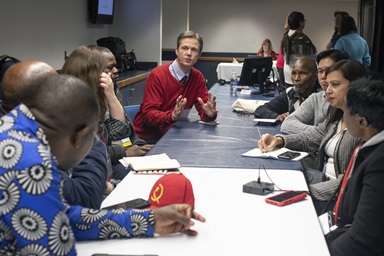Churches in Zimbabwe are making an effort to open easy means of giving using technology.
Church members can now give offerings, tithes and harvest giving using credit cards and mobile money transfer.
Zimbabwe is experiencing cash shortages forcing banks to limit cash withdrawals, some to as little as U.S. $50 per day. People are queuing for long hours to withdraw cash, and often failing to get it from their banks despite the wait.
The Reserve Bank of Zimbabwe is advocating for greater use of plastic money, with the intention of ensuring that 80 percent of monetary transactions are done using cards or electronic transfers.
Solomon Chiripasi, treasurer for the Zimbabwe Episcopal Area of The United Methodist Church, noted that the church is adapting to the fast-moving changes in the banking sector.
“Churches are announcing their bank account numbers so that members can do electronic transfers to the church account,” Chiripasi said. “Some have acquired point-of-sale machines so that members can swipe offerings, tithes, harvest and any other money they want to give to church.” Harvest giving in July is a special time of giving in Zimbabwe to celebrate the harvest. In rural areas, farmers might bring in produce or livestock for their giving.
Use of technology in church already was becoming popular as church members access hymns and Bible verses on tablets and phones. The church is being proactive on the current financial developments of giving, taking this as an engagement solution coming to facilitate healthy church growth in the digital age.
No longer waiting for Sunday
Congregates no longer wait for the Sunday service to give to the church. Giving is becoming an everyday activity whenever the need to give is placed on one’s heart. This has opened another door of instant thanksgiving and prayer request through giving.
As the Rev. Gift Machinga, conference board of discipleship chairperson, pointed out, “People can now pay their tithes anytime from anyway even if they are not at church physically.”
Members are now giving offerings for a Sunday service they did not attend. “Whenever they encounter God’s grace in their life and feel they should thank the Lord the door is now open to act instantly before the devil snatches the spirit of giving impressed on one’s soul,” Machinga said.
Simon Mafunda, the Zimbabwe East Annual Conference lay leader, projected an increase in offerings as people can now give anytime from anywhere.
The use of such platforms brings about transparency as it leaves an audit trail on the system that is verifiable. “Churches will have better security for their money and treasurers will sleep worry free,” said Mafunda.
Plastic money
Plastic money refers to the hard plastic cards used in place of actual bank notes. They can come in many different forms, such as cash cards, credit cards, debit cards, pre-paid cash cards and cards issued by various merchants in loyalty programmes. This card gives the holder the power to electronically transfer money to and from their bank accounts, without the use of hard currency.
Mobile banking is a service provided by a bank or financial institution that allows its customers to conduct a range of financial transactions remotely using a mobile phone without the need for internet connection. The services range from monitoring account balances, transferring funds between accounts, bill payment, airtime purchase and locating an ATM.
All of these electronic banking platforms lessen reliance on cash for day-to-day transactions, thereby bringing convenience and less risk of carrying cash or being confined by banking hours and locations.
Muzerengwa is a communicator for the Zimbabwe East Conference.
News media contact: Vicki Brown, news editor, [email protected] or 615-742-5470.
Like what you're reading? Support the ministry of UM News! Your support ensures the latest denominational news, dynamic stories and informative articles will continue to connect our global community. Make a tax-deductible donation at ResourceUMC.org/GiveUMCom.




